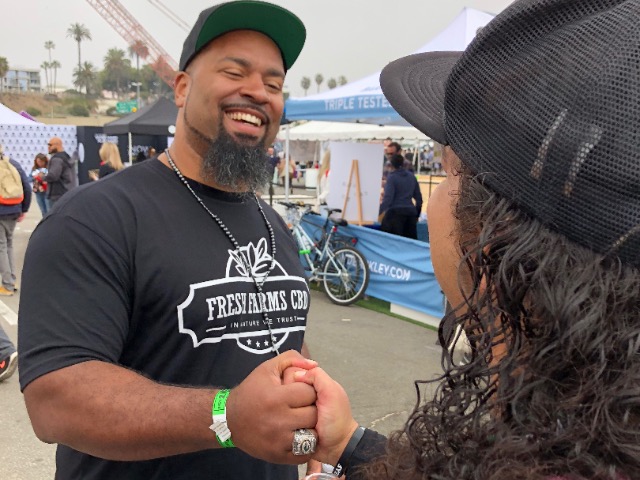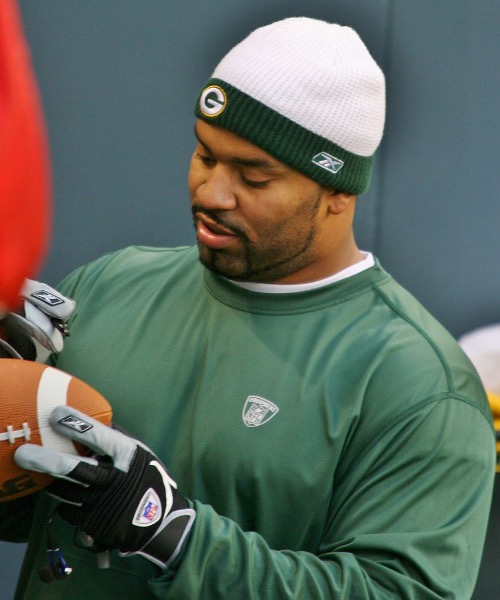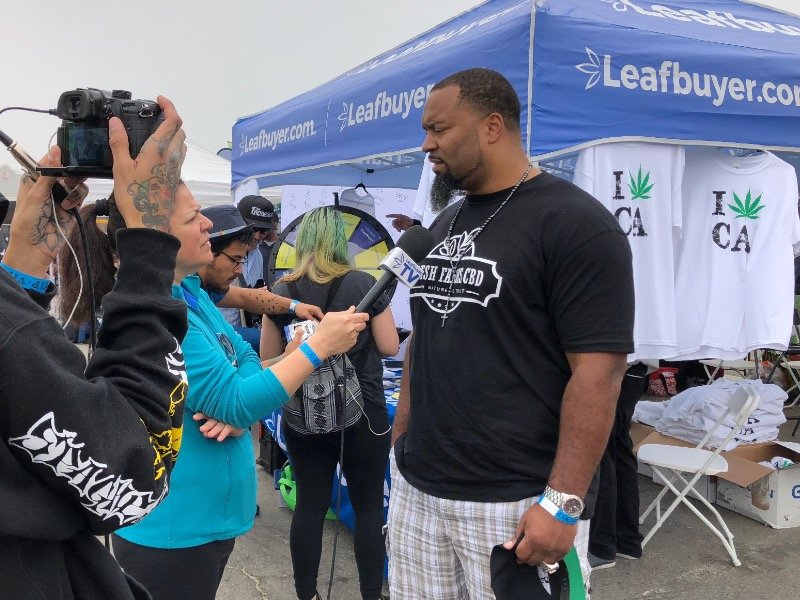Asking former Green Bay Packers defensive tackle Cullen Jenkins to list off the injuries from his 13-year career in the NFL is basically just asking him to list off body parts. Sprained knees. Sprained ankles. A broken hand. A chipped bone in his nose. Tendinosis in his Achilles. Torn calves. Torn cartilage in his ribs. A torn pec – the only injury that put Jenkins on the injured reserve. A torn triceps – though just a minor one.
"Just about anything you can injure, it’s been injured," Jenkins said with a laugh. Less than a year ago, however, it was no laughing matter.
Jenkins may have retired from the league in 2016 – a career including a Super Bowl win with the Packers in 2011 – but the pain left from his playing days followed him off the field. He tried battling his aching body as he did as a player: with pills. He recalled that for practices, he would often take two Tylenol and four Advil, while for games he’d upgrade to two Vicodin – one during pregame, a half just before taking the field and the other half at halftime. While those would ease his physical pains, he’d then use alcohol to help with the mental strains and stresses.
Without the drive of football anymore, however, the pills and drinking could no longer mask all of Jenkins’s pain and the sudden aimlessness of life after the NFL. He fell into a depression, numbed yet all-too-aware of the struggle he was going through.
"I watched my brother (retired NFL defensive tackle Kris) play and I watched him struggle with a lot of physical and mental issues after the game," Jenkins recalled. "So for me, it’s been something that I’m trying not to go through. You get to a point where you start to see yourself going through some of the same things you saw other players go through, and you realize how real it is – the things that you go through post-career and during your career."
Hope, however, came this year from a controversial place: cannabis. Or, more specifically, cannabidiol – or, as its more more commonly called, CBD – a chemical extracted from the plant that, according to Jenkins and the substance’s supporters, is able to settle chronic pain and emotional anxiety with none of the high commonly associated with the drug. Like anything remotely close to the cloud of marijuana, though, it’s come with debate, with some wanting more research and more oversight on a product taken from a plant still only recreationally legal in nine states.
Meanwhile, in just his short time using CBD, Jenkins has turned into vocal advocate for its use, investing in the brand Fresh Farms CBD and touring the country telling his story (most recently to TMZ) while promoting the growingly popular painkiller. Considering his Packer roots, it’s no surprise Wisconsin was on that tour – and while he was in the state, OnMilwaukee got to chat with the former football player about his time in the NFL, the future of the game and the future of his new pain reliever of choice.

OnMilwaukee: When did the pain start – not just regular everyday football pain but chronic pain?
Cullen Jenkins: I think the first real dose of it was when I had my ankle injury in 2006. I had a bone bruise that just wouldn’t heal, and it lasted for three years before I finally had surgery on it – I got the surgery right after I got my pec done. At that point, it starts adding up, all the wear and tear.
Was there ever a moment when you thought, "This isn’t right, I’m not supposed to be feeling this way. Is this worth enduring?"
You always ask. You always question if I should be feeling like this, this isn’t normal. But you’re taught from a young age to be a warrior. You fight through everything, and if you don’t, you get viewed in a bad way. If you show weakness, your opponents will try to take advantage of you. Usually the approach we would take was that it was mental, you gotta be strong mentally to fight through.
Now with what we know about concussions and the health of players after the NFL, is that still something we should be teaching?
It’s hard to say because the game is still a violent game, and it’s always going to be a violent game, but you just have to be smart in certain areas of it. When it comes to concussions and head injuries and things like that, you have to remember that. I mean, how many times do you see a player get dinged up or get dazed and they’re fighting to get back in? That’s the thing: A player’s not going to voluntarily take themselves out for that – and if they can hide it, you’ll never know. It’s only when they actually see it and when it’s blatant, that they’re aware of it, then they’ll take the player out. And even then the player’s trying to get back in.
When did you find CBD and come to your attention as a pain aid – and what were your first thoughts on it?
At the beginning of January. I was kind of struggling a little bit with everything going on. I had a couple of family members that were out, and they met with a guy talking about it. He thought it would be something good for me to try, that it could help. They came and brought it to me – and I just thought of cannabis and that it was just something that was gonna get me high. So I just set it to the side and didn’t take it for, like, two weeks. They kept asking me, "Did you try it? Did you try it?" and I was like, "Eh, not yet. Eventually." And finally they convinced me.
So when I tried it, I was expecting to get high – and it didn’t happen. I was feeling alright, but I still felt relaxed and cool. They told me to try it before I went to bed, and I slept better. I slept cool without having to take sleeping pills. I was like, "This seems like it helped!" But maybe I just had a good night, so let me keep trying it to make sure it’s consistent. So I kept on taking it and got into a more normal routine. The effects I felt in my body – and mentally as well – were great. And the best part is I don’t go to anything like Vicodin or Percoset or sleeping pills or any of that stuff that you get so used to taking while playing.
When did you realize that you couldn’t use that stuff anymore?
The pills helped – but you know that they’re not good for you. You get prescribed anti-inflammatories at the drop of a dime. And I’m talking prescription-strength anti-inflammatories. Indocin was a big one.
And as you go through more years in the league, I watched the progression of how the teams were starting to worry about it. Early in my career, they used to keep the prescription meds in the facilities, so anytime you needed something, the trainers would give it to you. You didn’t even have to go through the doctor; they would go to the safe and give you whatever pills you needed. Then as they had the lockout year and the government stepped in and cut that out, now the teams aren’t allowed to travel with the prescription drugs and just hand them out. Doctors have to write a prescription on a per case basis. But you can still get them. Whenever you’d get injured or something, you’d say, "Doc, I need something to help me through this, something to get me out there and play through it." It’d help, but you knew that it wasn’t good.
 (PHOTO: WikiCommons/Jame Healy)
(PHOTO: WikiCommons/Jame Healy)
How would the coaches or doctors respond when you said you were in pain? How did the system work?
It was pretty simple: The head coach wanted to know who was practicing. So if you’re not practicing, why is he not practicing, what’s wrong with him and how long is he going to be out? They’re always pushing you to get you back out onto the field as fast as they can. I remember when I was with the Giants, they frowned upon me because – was it a hamstring or a calf? I think it might’ve been a hamstring – they wanted to shoot it up. I watched them do that with a lot of other players; they’d pull a hamstring, and they would inject them the next day with something that they said would help make them heal faster. Like, that’s not how you … you can’t force a torn muscle to heal faster.
They want you to get on the field, and if you’re not on the field, you’re looked at as someone’s who’s unavailable. It’s not a good look, so most players try to do whatever it takes to get back on the field.
Do you think that’s getting better in the NFL?
I think the awareness is improving, but I don’t think it will improve. And the reason I don’t think it will improve is because you’re talking about players’ jobs, you’re talking about their livelihoods and making money. I tell people that, when I’m telling my story, I don’t look at myself as a victim in any way. If I could go back and do it all over again, I would do it the same way. And I think a lot of the players have that approach because they want to get a job or that big contract or stay on the field. You’re gonna try to do whatever it takes to get that – and then worry about it afterwards. For me, I’m at the afterwards part.
Now that I’m done, you need to find better ways to help players and coach players about managing these injuries, head issues, all the depression, everything, without prescribing pills.
Does the NFL prepare you for life after the NFL? It sounds like when you retired from the game, you didn’t know what to do.
Yeah, you don’t know what your support system is anymore, if you have a support system. (laughs) What was funny for me was, when I finished playing football – and I still haven’t gotten there – it was like now I need to find a personal doctor? Over all these years, I didn’t need a personal doctor – I had a team doctor. So now I have to find a personal doctor. How do I pick a good doctor? Do I take recommendations from people? Do I just look it up online? And if I get a doctor, do I start doing the same thing: go to him, explain to him my pains and then he’ll prescribe me with something to make it better? Then you’re just back in the whole same process again.
So how does CBD work? And how do you take it?
You can take CBD many ways. I even read some unpleasant ways that you could take CBD. (laughs) But a lot of the main ones are taking it orally or through a cream – and orally, it’s either pills or the CBD oil. The oil I have is Fresh Farms CBD, which you take with a dropper. They make it so you tailor the dose to how you react. It’s not just "everybody take this dose"; you experiment with the doses until you find the one.
There’s no THC in it. That’s the big thing I really like about it. Taking it, I’m not worrying about getting high. I’m just not the kind of person who can get high and function, so I’d rather use CBD products during the day.
Why do you think there’s a reluctance to make this a mainstream way of approaching pain – especially for athletes?
There’s a lot of money involved in big pharmaceuticals. So now you’ve got a new product coming in – and the product’s not being pushed by the same big pharmaceutical groups, so they risk losing. And a lot of people aren’t educated, and that has a lot to do with how they report on it. It’s the same way with gun reform, just grouping everything together. If you’ve got one side saying we need better gun laws, the other side comes back and says, "They’re trying to take all of our guns from us." With cannabis and hemp, it’s, "Take CBD; it’s been effective," they come back, "They want to legalize marijuana." They just group it together to give it a bad name.
You gotta understand that there’s different parts of it. I don’t think it should be considered a drug in the first place, but even if people do, you have to understand that CBD is not a drug; it’s a supplement. It’s not getting you high or any of that.
What do you think is the future of CBD – especially in athletics?
I think it’s already made some movement. The World Anti-Doping Agency dropped CBD off its list of tested supplements, so it’s making movement. But it’s moving at a snail’s pace, and we need to try to speed it up a little bit. I think there’s some other factors in why it’s moving so slow. I think it’s got a lot to do with money and getting the right people in place.
And as for the future of the NFL?
I feel like the NFL will survive. It’s going to continue to go through modifications and continue to change and tweak things. The game that was played when I first came in, or was played before I came into the NFL, it’s not going to be the same game ten years from now. But it’ll still be football. They’re already talking about taking out the kickoff, things like that.
They’re trying to adjust and make it a safer game, because it’s a very violent game. And to make it worse, you don’t have that many players, so the players you do have endure a lot through the course of pain and practices throughout the week. That could be something else they could look into: adding more players and having more players be available so you don’t have to take as much punishment during the course of a game.
And you’re feeling better now? What does it feel like day to day?
I was feeling really good, then Saturday I decided to play in a flag football tournament. (laughs) So it’s been rough. But I didn’t have to take any pills for this though. I just stayed on the CBD. I’m getting back to normal.
As much as it is a gigantic cliché to say that one has always had a passion for film, Matt Mueller has always had a passion for film. Whether it was bringing in the latest movie reviews for his first grade show-and-tell or writing film reviews for the St. Norbert College Times as a high school student, Matt is way too obsessed with movies for his own good.
When he's not writing about the latest blockbuster or talking much too glowingly about "Piranha 3D," Matt can probably be found watching literally any sport (minus cricket) or working at - get this - a local movie theater. Or watching a movie. Yeah, he's probably watching a movie.







